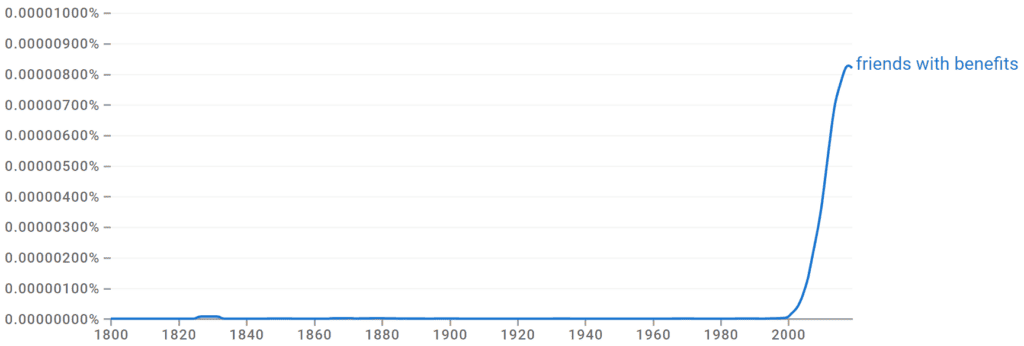Friends with benefits is a common English idiom we use to describe a friendship between two people that is also sexual, but there’s no deeper commitment. But where did this saying come from, and what’s the proper way to use it? Let’s get into it, and you’ll understand everything by the end of this article.
Friends With Benefits Meaning in English

Friends with benefits is an expression we use to describe two friends who are in a relationship that includes casual sex but without being emotionally involved or committed to each other in the traditional sense.
Contrary to what you might initially think, the benefits here don’t involve lending sugar or helping with DIY tasks. It’s a discreet way of stating that two people have a casual relationship with no strings attached.
How to Punctuate It
Normally, it’s spelled as friends with benefits. But if you’re using it as an adjective before a noun, you should hyphenate it.
- Dave and I are friends with benefits.
- Dave and I have a friends-with-benefits relationship.
Origin and Etymology of the Phrase Friends With Benefits

The term friends with benefits is really modern, having originated in the United States in the late 20th century. The phrase first appeared in print in Alanis Morissette’s 1995 hit song “Head Over Feet”:
You’re the best listener that I’ve ever met.
You’re my best friend.
Best friend with benefits.
What took me so long?
It wasn’t widely used until sometime in the 2000s. But the idea of such relationships dates back much further.
Friends With Benefits Synonyms
Here are a few other alternatives to saying friends with benefits that still get the same message across.
- Casual relationship
- No strings attached
- Booty call
- Fling
- Non-committal relationship
- Non-exclusive relationship
- Casual hookup
- Friends with perks
- Casual lovers
- Casual partners
Using the Phrase Friends With Benefits in a Sentence

- I know they’re not dating; they’re just friends with benefits.
- Jane and Adam were friends with benefits until Adam started dating another girl.
- I’m sorry, I’m not looking for anything serious, maybe just a friend with benefits.
- After they broke up, they decided to remain friends with benefits.
- They tried being friends with benefits, but one of them always wanted more.
- Being friends with benefits seemed like a good idea at first, but it eventually led to complications.
- She suggested they could be friends with benefits since neither of them wanted a committed relationship.
- Many college students are in friends-with-benefits relationships to avoid commitment.
- Setting boundaries when you’re in a friends-with-benefits arrangement is essential.
- Friends with benefits can get messy when emotions get involved.
Your Friendly Guide to the Friends With Benefits
No, the idea of friends with benefits doesn’t refer to your buddy who helps you with your math homework. This term, pulled straight from the modern dating world, is a non-traditional relationship concept that’s found its way into our daily lexicon. Now, you can confidently wield this phrase, knowing its true meaning, origin, and how to use it effectively in a sentence.
Check out some others we covered:
